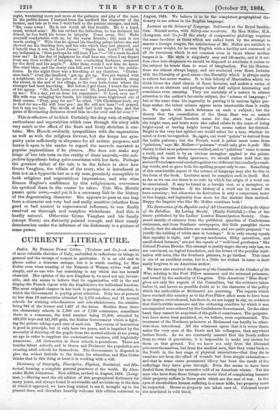Lectures on the Science of Language. Delivered at the Royal
Institu- tion. Second series, with thirty-one woodcuts. By Max Miller, M.A. (Longman and Co.)-11 the study of comparative philology requires the same faculties as those which are called forth by the attempt to master a foreign tongue, the conclusions of Ur. Muller are entitled to very great weight, for he uses English with a facility and command of all its resources which is not common even in those whose mother tongue it is. His style is singularly easy and idiomatic, and if it sel- dom rises into eloquence we should be disposed to attribute it rather to the subject he treats than to want of imagination. For his illustra- tions are almost always happy, and are scattered over these lectures with the liberality of good sense—the liberality which is always ready to relieve but never wastes. It is this felicity of illustration which we think forms the chief charm of these lectures, and makes a series of essays on an abstruse and perhaps rather dull subject interesting and sometimes even amusing. They are certainly of a nature to attract attention to the author's favourite subject, the "science of language ; " but at the same time his ingenuity in putting it in various lights per- haps makes the infant science appear more unscientific than it really is. We speak with much deference on such a subject ; but the theory that the constellation of the Great Bear was so named because the original Sanskrit name for the stars was riksha- the bright ones, and bears were also called riksha in the sense of being bright-eyed or having bright tawny far, seems rather far-fetched. Bright is the very last epithet one would select for a bear, whether its mind or form be regarded. So, again, our word "palate" is derived from the Latin palattun ; but the French word le palais must come from "palatium," says Mr. Mtiller—"palatum" would only give le pale: His theory is that most palaces were vaulted, and so" palatium" came to mean a vault, and vault is by an obvious metaphor applied to the palate. Speaking in more fleshy ignorance, we should rather hold that the ancient Frenchmen confounded together two different but similarly sound- ing words, and so gave both the spelling proper only to one. Something of this unscientific aspect of the science of language may also be due to the form of the book. Lectures must be complete each in itself. But so far as we can see there is no rule by which the origin of a word can be ascertained. It may be found in a foreign root, or a metaphor, or even a popular blunder. If the history of a word can be traced we have certainty ; but otherwise its derivation is only a conjecture, more or less happy, and ingenuity does more for the student than method. Happy the linguist who like Mr. Mailer combines both !






























 Previous page
Previous page